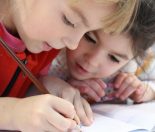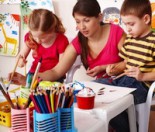Dr Maria Montessori founded the first Montessori community in 1907 in the slums of Rome, Italy and an educational philosophy grew from her work with these fifty poor, illiterate children.
Today Montessori is the single largest ’pedagogy’ in the world, with over 22,000 schools in more than 100 countries on 6 continents. Celebration of the centenary of Montessori in 2007 validates it’s continuing relevance for future generations.
Montessori offers a choice for New Zealand families, with more than 80 early childhood centres, 34 primary classes and two high schools providing Montessori learning communities throughout the country.
The aim of Montessori education is to place all the children in the world at the centre of society and to assist them in becoming caring, self-motivated and fulfilled individuals, able to create a sustainable and peaceful future for humanity.
Dr. Montessori believed that by placing children in a stimulating, specially prepared environment, their natural curiosity would help them become self-motivated learners. She stressed following the interests of the child with a focus on self-discovery. Education is ‘preparation for life’, not merely a search for intellectual skills or preparation for school.
Montessori ECE centres in New Zealand
There is no Montessori franchise in New Zealand. Montessori early childhood centres are independent businesses, often privately owned or run by community or parent groups. The name Montessori has never been able to be trademarked and any centre can choose to use the name “Montessori”.
The goals of Te Whaariki, the ECE curriculum, are met through the Montessori approach.
What to look for
Visit a Montessori preschool centre and observe the children. Look for children independently choosing their own work and the teachers encouraging the children’s open-ended exploration of the Montessori materials and activities. Observe for children taking the initiative to actively care for each other and their environment. Are they having fun? Look for teachers interacting with the children at their own level, in calm, quiet voices, in one to one or very small group situations.
Do the teachers have Montessori training?
Montessori teachers need specialist Montessori qualifications for the age group they teach in addition to NZ early childhood qualifications. Ask which teachers have Montessori training. At least one teacher per classroom needs to have Montessori training. This teacher should be in charge of the class.
Montessori Learning Community
The Montessori classroom is characterised by multi-aged groupings of at least three years. In early childhood children start around 2 1/2 to three years and stay until they are six years old. The most optimal experience is gained when the child experiences Montessori from three until close to six years of age and attends daily.
The Montessori curriculum
The daily practice of Montessori philosophy is made possible by a defined curriculum using specially designed ‘’hands on’’ learning materials. Ask to see the Montessori materials and get the teachers to explain how the child discovers and explores with these materials. Children are exposed to a rich curriculum including music, art, language, mathematics, geography, botany and zoology. There should be very few puzzles, toys and no workbooks !
Prepared Environment
Montessori is a way of being – it does not stop and start at specific times or only occur indoors! Indoor and outdoor environments provide rich learning experiences for the child. Activities are purposeful, real, explorative and have a cycle of activity. The Montessori environment is orderly and structured simply to enable the child to make independent choices for their learning.
Long uninterrupted work periods
Dr Montessori discovered that young children need to be active for long periods of time in concentrated activity. If constantly interrupted children are not able to reach a state of deep focus and will only choose work that needs a superficial involvement. Look for a centre that has at least one three hour “work” period per day and few whole group times.
Real Contribution
Children have daily opportunities to learn and use practical life skills that enable the young child to develop concentration and prepare them for more focused work.
The young child is provided with real implements and given real responsibilities in the care of the environment and care of themselves and others. If a Montessori child cooks – they cook food that can be shared with classmates. Flowers are arranged by the children to beautify the room, windows are cleaned, shoes polished, tables scrubbed, decks swept – all activities that young children relish ! Becoming competent develops a strong sense of self esteem.
Focus is the Children
Montessori reaches it’s full potential when the number of adults is kept to the minimum, since the real work of learning belongs to the child. There should be a minimum of adults present (in NZ 1:10 ECE children), since interruptions by adults detract from the child’s ability to become absorbed in their chosen activity or work. Montessori teachers are very skilled at protecting the child’s concentration while maintaining warm, interactive relationships when invited by the child.
Montessori Association of NZ
The Montessori Association of New Zealand was established in 1982. Membership of MANZ is voluntary and schools are not assessed by the Association as to their authenticity or otherwise of their Montessori programmes. Member schools are active participants in Montessori professional development and provide parents with a quarterly magazine focused on Montessori. Montessori ECE centres that belong to MANZ can be found at www.montessori.org.nz/memberschools.shtml
Detailed guidelines for parents seeking quality Montessori centres are being developed by MANZ. Any queries, please phone 0800 33 66 12.
Useful Websites
Website for the Montessori Association of New Zealand.
Acknowledgement: This article was written by Ana Pickering, Executive Officer of MANZ.
Child’s Birthday gift? Find a great selection of popular Books & Authors.Age: 0 1 2 3 4 5 6 7 8 9 10 11 12 Years Old |
||||
|
|
|
|
|
|










